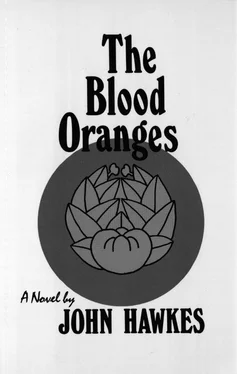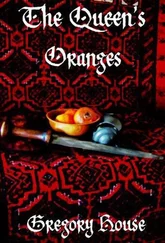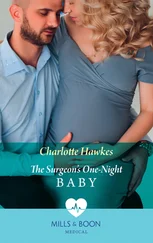I was close enough now to see the pocks in the fired flesh of the old pot and to see the bones in Rosella’s shoulders and the crow’s-feet at the corners of her youthful eyes. Her skin was swarthy, her nose was oddly aquiline, no doubt she was a long-descended daughter of the barbarians. But in her childhood had she also been tutored in the lore of the female saints? Is that where she got her indifference, her strength, the blunt crippled look in her dark eyes, from wooden pitchforks and the lives of the female saints?
There was moisture in one of her nostrils, her hands curved naturally to the roundness of the pot, a little dried blood was caked on one of her feet. For a moment I thought of Catherine, as I often do, and then wished that Fiona could see me boxed in by the funeral cypresses with Rosella whose head barely reached my chest and whose voice I hardly heard from one month to the next.
And with my knuckle tapping the earthen shape in her arms: “This evening, let’s see if we can fill it right to the brim, Rosella.”
Moments later I was once more able to enjoy the sound of heavy snails falling into the wide-mouthed pot. In the twilight we were side by side, Rosella and I, kneeling together at the edge of a small rectangle of pulpy leaves. The snails were plentiful and the sticky silver trails crept down dead stems, climbed over exposed roots, disappeared under black chunks of decomposing stone. Everywhere the snails were massing or making their blind osmotic paths about the villa, eating and destroying and unwinding their silver trails. They were the eyes of night, the crawling stones. “Faster, Rosella,”I murmured, “a little faster.”
She seemed to understand, and shifted her knees further apart, tightened her kneeling animalistic posture, tugged at a small jagged shard of buried tile and suddenly unearthed a pocket as large as the blade of a shovel and packed like a nest of mud with the sightless snails. In both hands she scooped them up and, while I steadied the pot, dropped them covered with flecks and strings of fresh mud into the warm hole of the pot. Then I laughed, reached into the pot with my large white hand, frayed cuff and golden cuff link (anniversary gift from Fiona), seized one of the snails and pulled it out quickly and smashed it against the cream-colored grainy side of the pot.
“That’s what they look like, Rosella. Smell?”
She was backing up. Her haunches moved, her thighs began to work, again one of her sandals cracked against the pot, and suddenly one hand reached behind and tugged up the constricting skirt of her hemp-colored dress. Rosella, I saw, was moving backward. And smelling the gloom of the funeral cypresses, I laughed and, despite the rules, thrust out my hand so that in another moment my hand might have confronted her flesh and staved off the now partially exposed buttocks, though even my hand pushed hard against her buttocks could not have prevented us from tangling in what would have been a kind of accidental Arcadian embrace. I lost hold of the pot and it tipped over. Rosella looked at me, and in the clear rose-tinted twilight and amidst small noises of grass, brambles, stones all disturbed by our movements, I thought that Rosella’s eyes reminded me of the bulging eyes of my little long-lost golden sheep. And then we stopped. Stopped, waited, listened, heard the ticking of the grass, the brushing sounds of a few small birds, the slow dripping of contaminated water and, from somewhere in the increasing shadows, footsteps.
“Someone’s coming. Hear it?”
And then it was dark, and I smelled the flaking roof of the well house and stood up and brushed the burrs from the sleeve of my jacket, straightened my golden eyeglasses, pulled at the little points of my vest, and immediately saw the hunchback standing beneath the rotting arbor with a stone crock in his arms.
Leather coat, leather cap, rubber boots, shoulders as broad as mine, even in the deep green light from the funeral cypresses and with a cluster of dead grapes brushing his high muscular hump, still I could see that he was someone easily frightened. And yet he was staring not at me but at Rosella, seemed to expect not an assault from me but rather some kind of recognition from her. When he spoke as he then did, it became obvious that he was young. He took a breath, his lips moved, he spoke. And out of all that leathern bulk and deformity of a man who looked like a capped and muzzled bear came a voice that suggested only the softness and clarity of a young girl’s voice poured from a shy pitcher. Croak peonie, he must have said, or crespi fagag . I could not be sure.
“Who is he, Rosella? Your brother? Cousin?”
I was right, of course, because Rosella said a few words not to me but to the deformed intruder who turned, put down his crock, and in the darkness and crushing shriveled grapes beneath his boots, disappeared around the corner of my long low-silhouetted villa. By now everything had succumbed to the light of the somber trees, to the silence, to the purple shadows of the cypresses. And in this silence, this gloom, the crock was white and plainly visible. I took a step. I heard the slapping of the wooden flats, felt Rosella’s shoulder brush my sleeve in passing, saw her little shadowy figure stooping down. And Rosella and the white crock were gone.
Night. Silence. Decayed and dormant stones, tiles, vines. Crude arbor. From my pocket I fished a cigarette, glanced up at the stars, inhaled. Turning to retrieve the pot of snails I paused, inhaled again, thought I detected in the wall of funeral cypresses that narrow but convenient passage through which I used to make my nightly way to Catherine.
No regrets.
In my mouth the smoke was the color of mustard, around my ears the curling hair was both gold and gray, overhead the night was thick with stars. So I had no regrets. I smelled the peppery darkness, retrieved the pot and left it where Rosella could dump the snails down the hole in the flat stone of our crude lavatory in the morning. Then I groped my way toward Rosella and the light of the olive-twig fire, the smell of smoke.
At first glance I thought the crock was packed with fur, because by the uneven light of Rosella’s fire the soft brown substance rising somewhat higher than the square mouth of the crock rippled and gleamed softly, was alight with richness and flashing colors so that it suggested fur. But my fingers told me immediately that the crock was packed not with fur but birds. I could feel their concealed bodies smaller than the bodies of mice, could feel the fiercely contracted wings, the feet like flecks of wire, the little beaks that made me think of the sharp nibs of old-fashioned pens. I seized one by a brittle wing and held it to the light and recognized it immediately as some kind of sparrow. More than three or four dozen sparrows in a stone crock, and obviously Rosella intended to cook them all. And weighing the almost weightless bird in my palm I knew, suddenly, that the crock was a gift and that all the time we were hunting snails Rosella had known it would arrive, was perhaps instrumental in its arrival.
Had she asked that disfigured youth to shoot sparrows among the rocks and in the steep, sparsely wooded hills near the sanctuary? On her demand had he spent all day discharging his untrustworthy weapon at those swift targets? Had Catherine heard those very shots? And was all this for me? All this for the idle middle-aged man from over the mountains? Three or four dozen sparrows, I thought, were a good many.
We cooked them together, ate them together. For the first time I not only ate with Rosella but joined her in that damp cavelike room of stone and tile where, until now, Rosella had moved alone with a young woman’s bored carelessness through all her days and nights of cooking. I joined her and removed my black coat and in frayed shirt sleeves and soiled vest sat beside my standing Rosella and helped her, pulled the feathers from my share of the sparrows, which was no easy job, and despite my size hovered as near as I could to her shoulder while inside the casserole she built up the layers: butter, thyme, sparrows, onions, butter, thyme, sparrows, onions, and so forth. She prepared a sauce and I scrubbed out the iron vessel. Hovering stolidly beside Rosella, I sniffed the now browning sparrows and fed the fire, felt the oil of the cooking birds on my own brow and on my cheeks, felt without a single touch each movement of Rosella’s small bones, muscles, ligaments. I watched Rosella’s fingers at work, fingers even now stained with the black earth of my garden. Sometime toward the end of these preparations I sighed a deep sigh and realized that next time I too would be able to tie the wings, chop off the miniature feet.
Читать дальше












